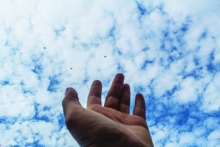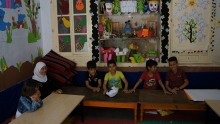As I toured the World Vision-supported Urfa Community Centre in Ṣanliurfa, Turkey, I lingered in front of a photograph displayed on the wall of the art room. A hand, fingers outstretched, seemed to be trying to touch heaven, while birds circled high in the distance. Knowing that the Centre served Syrian refugees, I imagined her photograph meant, "I want to escape earth, its confusion and death, to fly with the birds in the peaceful heavens." But what did it mean to the photographer who took it? I asked if it would be possible to meet him or her.
Nawar Mustafa, the centre’s communications officer, knew exactly who it was: Maila, a young Syrian woman, who took photography classes at the centre. He phoned her, and she agreed to come to the centre to meet me.
When Maila arrived, I was impressed with her smile. We exchanged greetings in Arabic and English, as Nawar translated for us.
“You are a talented artist and poet, Maila. Can I please ask what inspired this photograph?”
“I like dreaming more than reality, so I took this photo,” Maila shared. Knowing that she was a Syrian refugee now living in Turkey, I could only imagine how true that was.
Curious, I asked, “What do you dream of?”
“A lot,” Maila said. “Continuing my studies, leaving Turkey... I cannot continue high school here.”
I expressed how difficult that must be for her. Many Syrian students have been unable to continue school in Turkey, because of language barriers, the lack of educational facilities for the huge influx of refugees into Turkey, and overwhelmed social services.
“That’s why I’m dreaming,” Maila answered.
I asked her to share more of her story, and how she had arrived in Turkey. She explained she came suddenly. Her father left first, to arrange a place to stay. About two months later, he sent for the rest of the family. Her mother, four sisters, and brother now live in Urfa, as the city is commonly called.
“I am 18 years old. My brother Nuri is 23. Isra is 21, Hamal is 15,” Maila explained. The family fled Aleppo, Syria, three years ago, after her house was bombed. Her father’s three shops were also bombed, so he could no longer provide for the family. He had run a logistics business serving the university.
Only 15 years old when they left, Maila was in her first year at high school. They first fled to Afrin, where they stayed at her grandfather’s house. Then, her family moved to Urfa.
Maila now spends her free time at the community centre. Although it was her photography and drawings that caught my attention, her first love is music. She takes every music course the centre offers. In fact, when I was admiring her photograph, she was among the students practicing the guitar and saz, a traditional long-necked, stringed instrument, nearby. She also studies drawing and painting.
“I do art because it makes me feel better. Music is my life,” Maila shared. Imagining that she wanted to be a musician when she grew up, I asked what her ambitions were. Instead, she wants to be a doctor.
“Inshallah [if God wills], you will be,” I responded.
I reached for one of Maila's drawings, depicting two broken glasses decorated with flowers, and asked Maila to translate the text she had written on it. She said, “Be a professional photographer in your life, to always capture the good side of people, from a pure lens, from the perfect angle.”“What were you trying to portray through these broken glasses?”
“At first our life was broken, like these glasses, even in Urfa. Then, roses began to grow.”
How beautiful! This young woman, who has already experienced such devastation – the bombing of her city, her home, fleeing her country, the inability to continue school – still manages to grow roses out of the thorns in her life. She continues to see the best in people, and difficult situations. Her eye is indeed a pure lens. She manages to hold onto her dreams, and continues to reach for them, even if they seem as remote as heaven.
“Maila, I hope your dreams come true.”
“Amin,” she responded, “inshallah” (if God wills).
This article was originally published on wvi.org.
Photos: Carole St. Laurent speaks with Maila in the courtyard of the Urfa Community Centre in Turkey. (credit: Suzy Sainovski/World Vision).
Hand Reaching to Heaven (credit: Maila Hasso).
Children enjoying activities in the Urfa Community Centre (credit: Carole St. Laurent).
How Art Helps Refugees
In May 2016, I went to Turkey to help World Vision International share its work with Syrian refugees in Ṣanliurfa, a traditional city 60 km north of the Syrian border. The Urfa Community Centre was established three years ago when the refugee influx began, and is growing rapidly to meet the psychosocial, economic, medical and practical needs of an estimated 500,000 refugees. One of the most effective ways of doing so is through art. Whether it is preschoolers drawing pictures in the child-friendly space, finding respite from crowded homes and stressed caregivers, teenagers learning photography or painting, or the chance for established artists to help their fellow Syrians, the arts offer an outlet for the stresses of the war - as well as a window into the hearts and experiences this conflict-affected people have suffered."Three years ago, we had no humanitarian industry," explained Serhat Tok, one of the staff members at the centre where Maila studies art and music. When the Syrian war broke out, and over 3 million refugees flooded into Turkey, IMPR, the organisation he worked for, established IMPR Humanitarian, expanding from academic to practical work. They quickly established centres to help them, such as the one in Urfa. But the needs far exceed the demand.
- Log in to post comments


